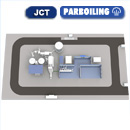Amidst the sea of options in the world of rice milling machines, finding the perfect fit for your business can feel like searching for a needle in a haystack. With so many factors to consider and features to weigh, it's easy to get lost in the maze of options. Fear not, for we have crafted a comprehensive guide to navigating the world of rice milling machines. Join us as we unravel the complexities, explore the possibilities, and arm you with the knowledge you need to make an informed decision for your milling needs.
Choosing the Right Rice Milling Machine for Your Needs
When it comes to selecting the right rice milling machine for your specific needs, there are several factors to consider. Capacity is a crucial aspect to think about, as it will determine how much rice the machine can process in a given timeframe. Efficiency is another important factor to consider, as you want a machine that can produce high-quality rice with minimal waste. Technology plays a significant role in modern rice milling machines, with options ranging from traditional models to more advanced, automated machines.
Additionally, consider the space you have available for the machine, as some models may require more room than others. Maintenance is also key, as you'll want a machine that is easy to clean and requires minimal upkeep. Finally, think about your budget and compare prices and features to find the best value for your needs. By carefully considering these factors, you can navigate the world of rice milling machines and find the perfect one for your operations.
Understanding Different Types of Rice Milling Machines
When it comes to rice milling machines, it is important to understand the different types available in the market. Each type of machine has its own unique features and capabilities that cater to specific needs in the rice milling process.
One popular type of rice milling machine is the traditional huller mill, which is commonly used for small-scale rice processing. These machines are known for their simplicity and efficiency in removing the hull from the rice grains. Another common type is the modern whitener, which is designed to produce high-quality white rice by removing the bran layer. Additionally, the polisher machine is used to give the rice grains a shiny appearance by removing the remaining bran particles. Other advanced machines such as the parboiling machine and the color sorter are also available for more specialized rice processing needs. Understanding the different types of rice milling machines can help you choose the right one for your specific requirements.
Type |
Features |
|---|
Traditional Huller Mill |
Simple and efficient in removing hull from rice grains |
Modern Whitener |
Produces high-quality white rice by removing bran layer |
Polisher Machine |
Gives rice grains a shiny appearance by removing bran particles |
Parboiling Machine |
Used for specialized rice processing needs |
Color Sorter |
Advanced machine for quality control in rice processing |
Key Features to Consider When Selecting a Rice Milling Machine
When selecting a rice milling machine, there are several key features that you should consider to ensure you choose the right one for your needs. First and foremost, **capacity** is a crucial factor to keep in mind. You will want to select a machine that can process the volume of rice you need efficiently. Whether you are a small-scale farmer or a large commercial operation, ensuring that the machine can handle the amount of rice you plan to mill is essential.
Another important consideration is the type of rice that the machine is designed to process. Some machines are better suited for specific types of rice, such as long-grain or short-grain varieties. Make sure to choose a machine that is compatible with the type of rice you will be milling to achieve the best results. Additionally, durability and ease of maintenance are essential factors to consider to ensure that your machine will last for years to come with minimal downtime.
Tips for Maximizing Efficiency and Quality in Rice Milling Operations
In order to maximize efficiency and quality in rice milling operations, it is crucial to understand the various types of rice milling machines available in the market. Investing in the right machine can greatly impact the overall productivity and output of your mill. Some key tips to consider when navigating the world of rice milling machines include:
- Choose a machine that is suitable for the type and volume of rice you will be processing.
- Look for machines with advanced features such as automatic feeding systems and precision milling technology.
- Regularly maintain and clean your machines to ensure optimal performance and longevity.
- Train your staff on how to operate the machines safely and efficiently.
Additionally, it is important to establish a quality control system in your milling operations to ensure that the final product meets the highest standards. This can involve implementing measures such as:
- Regularly testing samples of milled rice for quality and purity.
- Adjusting milling settings to achieve the desired level of polishing and texture.
- Properly storing milled rice to prevent spoilage and maintain freshness.
- Implementing traceability measures to track the origin and processing of each batch of rice.
In Retrospect
As you venture into the world of rice milling machines, remember that knowledge is power. With a comprehensive understanding of the types, functionalities, and key features of these machines, you are better equipped to make informed decisions for your milling operations. Whether you are a seasoned professional or a newcomer to the industry, the right equipment can make all the difference in ensuring efficiency and quality in your rice processing. So, keep exploring, learning, and innovating as you navigate the fascinating world of rice milling machines. Happy milling!

